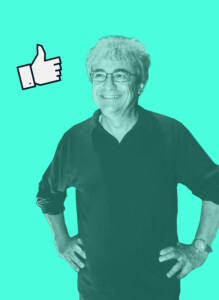Estimated reading time: 5 minutes
by Dr Jim Walsh, CEO of Conway Hall

In September 2022, professor of physics, Carlo Rovelli, wrote a piece of mainstream journalism. The article, based on quantum physics, made the argument that we ought to consider reality in terms of interactions rather than being made up of individual entities. It also nudged towards ethics by stating that prioritising individual countries (or groups of countries) leads to war and prevents humanity from addressing challenges that we face as a whole. I like Carlo. I think he makes a lot of sense and that his thinking can be applied to our thoughts about human individuals.
The notion of the human individual is one that has many starting points in history. My favourite, because of its simplicity, is René Descartes’ cogito. The purity of “I think, therefore I am” has inspired multiple philosophers over the years.
 However, in my opinion it is also one of the greatest philosophical obstacles that we need to overcome. When our starting point is rooted in the “I” we invariably set out with an attitude of how the world appears to us as that “I”. If we accept that the cogito makes sense as a bedrock for thinking, then we start to construct our thoughts and the world around us in such terms as “I see a tree before me”. Or “this person is different to me.” Our perspective becomes shaped by the narrative of what is “I” and what is “not I”. As well as being useful in determining so many aspects to our lives and helping us grapple with the world around us, I’m afraid that it also makes for a very ego-centric stance.
However, in my opinion it is also one of the greatest philosophical obstacles that we need to overcome. When our starting point is rooted in the “I” we invariably set out with an attitude of how the world appears to us as that “I”. If we accept that the cogito makes sense as a bedrock for thinking, then we start to construct our thoughts and the world around us in such terms as “I see a tree before me”. Or “this person is different to me.” Our perspective becomes shaped by the narrative of what is “I” and what is “not I”. As well as being useful in determining so many aspects to our lives and helping us grapple with the world around us, I’m afraid that it also makes for a very ego-centric stance.
To see the world as that which is “not I” places us apart from that which we encounter. Whether it is another human, garden, river, cat, marsupial or buffalo. All are cast out from us when we start from the notion of there being an “I”. This means that at the level of understanding, when we start to think about our lives, we often think about how the “other” (person, river or buffalo) might impact upon us. Could that “other” help me? Could the “other” hurt me? There is no getting away from me, me, me. Everything has to relate to me when I think from the perspective of “I”.
So, is there a different way to think? Carlo points to interactions as a potential perspective for us to consider. Can we consider ourselves in this way? What might it be like to think in this manner? I imagine that rather than considering myself as a physical mass of flesh, bone and skin etc. with a past that has many narratives regarding family, upbringing, schooling, work and various homes, I need to place these thoughts to one side. In their stead perhaps I can start to see myself as a sum of interactions.
To make this easier, maybe I should limit this exercise to just interactions with other people (rivers, cats and wider matters can come later). When I interact with others what happens? At a basic level, I talk, they talk. We converse on a subject. Going slightly deeper, we each listen to the other and hopefully respond to what the other has just said. Even deeper still, we might quell our own bubbling thoughts and listen properly before blurting out what we have impatiently been stifling whilst trying to look as though as we are listening. All of these interactions, though, are just one “I” meeting with another “I”. What could we do that would make it more along Carlo’s line of thinking – where we go beyond the “I” into an interaction conception of ourselves? Possibly, a helpful line of thought comes from another French philosopher, working a few centuries after Descartes.
Emmanuel Levinas famously wanted a philosophy based upon ethics. In fact, his idea was best summed up as ‘Ethics as First Philosophy’. What this meant in practice was that he by-passed the individualistic starting point of Descartes’ cogito and replaced it with ethics in the form of responsibility.
His foundation point was that before everything else (including “I think, therefore I am”) I am responsible for the other. This meant that the impact of the other (normally a person for Levinas) came ahead of thinking about oneself. To see another human is to immediately be responsible for them.
There is much to this philosophy and it requires a huge leap of understanding if one is to understand, accept and follow its logic. The reason I have introduced it, though, is because it shows that it might be possible to think beyond the narrative ego-centric trappings of the cogito.
 Imagine if we could embrace Levinas’ philosophy and take on the level of responsibility he desired. Surely, if we could do this our actions would be remarkably different? Rather than thinking about the impact that others (we are back to people, cats, rivers, and buffalo etc.) have upon ourselves, we might think about our impact (or responsibility) upon the others we encounter. Levinas, then, it might be said offers a reversal of positioning that acknowledges and tries to neutralise the egocentric approach of individualism.
Imagine if we could embrace Levinas’ philosophy and take on the level of responsibility he desired. Surely, if we could do this our actions would be remarkably different? Rather than thinking about the impact that others (we are back to people, cats, rivers, and buffalo etc.) have upon ourselves, we might think about our impact (or responsibility) upon the others we encounter. Levinas, then, it might be said offers a reversal of positioning that acknowledges and tries to neutralise the egocentric approach of individualism.
Perhaps we might even say that Levinas provides an antithesis to the cogito? The difficulty, of course, is that Levinas’ ask of us feels very extreme. How can I really place others first before me? How can I really take responsibility for the actions of others? It feels on first reading too much to bear.
Maybe there is a middle ground, where we start to understand through the eyes of those we encounter? Maybe we can get to a point of seeing ourselves from without – objectively and non-ego-centrically? Perhaps we might even be able to build a picture of ourselves that balances what we think and feel about ourselves alongside how others see us through their interactions? Maybe I am more than sum of my flesh, bone and past memories? Maybe I am also the sum of the conversations I have with my family, friends and colleagues, plus the actions/choices I take when I wash my hands, cook and eat? Maybe my discussions, actions and interactions do make me more of whom I actually am than I might think?
In this sense, if I can shift my thinking, perhaps I might no longer think of myself as an individual? Instead, I might become more of a participant where the weight of my interactions matter more than my ego-centric sense of self? Perhaps I might even be able to stop myself at times and consider the impact of what I am about to say or do on all those others around me?
Apparently, thinking ethically will sometimes produce a paragraph of questions. Which, it should be said, is no bad thing.